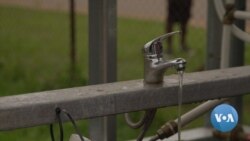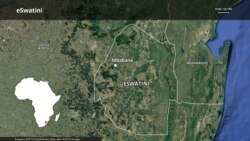For more than a year, nurse Lindiwe Magongo has seen to the needs of 600 patients per week at her small clinic near the capital of eSwatini, the nation formerly known as Swaziland.
And until very recently, she’s fought both ordinary health issues and the global coronavirus pandemic without the most basic health care tool: clean, hot water.
Doctors say handwashing, hygiene and sanitation are key to curbing the spread of illness. The coronavirus, which causes the COVID-19 disease, has claimed nearly 700 lives in this nation of just over one million people. But before the pandemic hit, 82 percent of clinics in this small, landlocked southern African nation lacked this vital tool. In recent months, a multinational initiative has installed an outdoor solar-powered handwashing station in every clinic.
On a recent weekday, Magongo beamed at the new handwashing station at the gate of her clinic. Dozens of emaSwati, as the people of eSwatini are called, had lined up before the clinic opened, and were now filing in after washing their hands.
It is not just a concrete structure consisting of a heavy sink and a durable solar water heater, she said — though it is, literally, that.
To her, it represents possibility. Magongo says the hot water station is also used to clean the clinic and brew tea for staff. Patients can take water home if they like.
“I will call it a sculpture,” she said. “Because the water is going to be here for quite some time. We are saving a lot because this is economically accessible to use and no electricity failures. Even if we experience power cuts, this service continues to work. So, in that sense, it is economical, and it’s going to be here for quite some time. We’re really, really grateful.”
VOA asked acting Prime Minister Themba Masuku what seems like an obvious question: why didn’t the government do this before? Why wait for foreign donors?
Masuku said it’s not that easy for a cash-strapped government with limited manufacturing capabilities and an unreliable electricity supply. When the pandemic hit, he said, eSwatini struggled to acquire basic items like masks.
“One of the priorities was to build the clinics first,” he said. “Because you can’t put this stuff here without clinics. As we were building the clinics, as we have 92 of them now, those public health facilities, the stakeholders came in, they wanted to assist and we gladly accepted that. So, everything is prioritized. Health is one of our major priorities. And this is why we thought building the clinics before we get the hot water would be ideal.”
At her small clinic in Ezulwini, Magongo said it also breaks what she described as a stigma around handwashing.
“Whenever we wash hands, it means we are going to eat,” she said. “Going and washing hands all the time -- it’s un-African. We grow up knowing that, it is un-African to keep on washing hands. Why? There’s always that why, why, why do you keep on washing your hands? This is going to break (the stigma). And COVID-19 has also helped us in breaking that.”
A year ago, Australian solar energy entrepreneur Robert Frazer landed in eSwatini for two weeks of meetings. Then the pandemic struck, and as he sat in lockdown halfway across the world from his Sydney home, he thought: why not do something?
In that year, his company — with extra funding from the German government — has installed 92 of these $3,500 stations.
“There was a very obvious need, and we had the products, we had the relationships, the expertise, to actually deliver a project that would really make a difference in a very short amount of time,” he told VOA. “And actually, to be frank, for a reasonably small amount of money.”
Frazer stresses that he’s not running a charity — they’re a for-profit company, and this project has paved the path for a $100 million solar-storage project in eSwatini.
Health Minister Lizzy Nkosi says hand hygiene is a key weapon against the infection — and one that eSwatini needs while it launches its mass vaccination campaign in the coming weeks.
“It’s not only bringing hot water in places where we would never have dreamt we would have hot water, but is reinforcing age-old infection prevention measures that the ministry employs every time, whether we have an outbreak of measles, of diarrhea, any outbreak,” she said.
"Don’t take clean, hot water for granted," she said.






